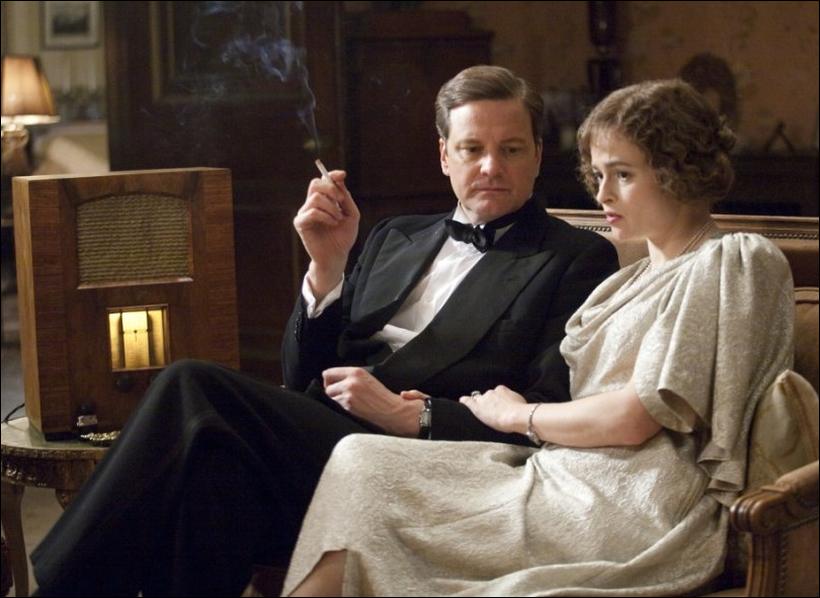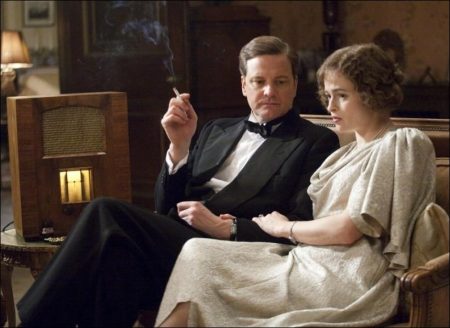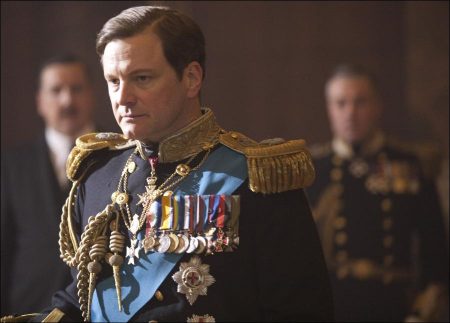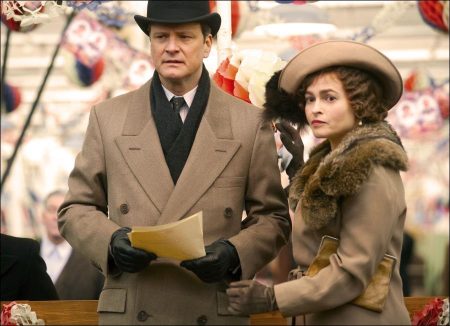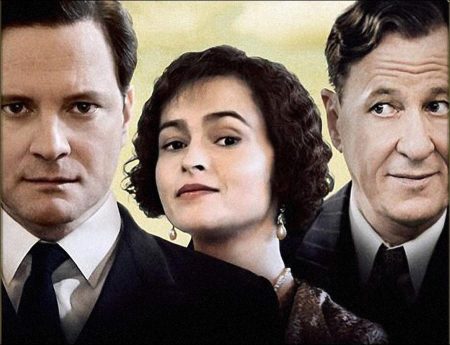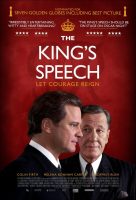Taglines: Let courage reign.
After the death of his father King George V (Michael Gambon) and the scandalous abdication of Prince Edward VII’s (Guy Pearce), Bertie (Colin Firth) who has suffered from a debilitating speech impediment all his life, is suddenly crowned King George VI of England.
With his country on the brink of war and in desperate need of a leader, his wife, Elizabeth (Helena Bonham Carter), the future Queen Mother, arranges for her husband to see an eccentric speech therapist, Lionel Logue (Geoffrey Rush). After a rough start, the two delve into an unorthodox course of treatment and eventually form an unbreakable bond.
With the support of Logue, his family, his government and Winston Churchill (Timothy Spall), the King will overcome his stammer and deliver a radio-address that inspires his people and unites them in battle. Based on the true story of King George VI, The King’s Speech follows the Royal Monarch’s quest to find his voice.
The multi-award-winning cast includes Helena Bonham Carter (Alice In Wonderland) as Queen Elizabeth the Queen Mother, Guy Pearce (The Hurt Locker), Derek Jacobi (The Golden Compass), Timothy Spall (The Damned United) and Michael Gambon (Harry Potter).
The King’s Speech is a British historical drama film directed by Tom Hooper and written by David Seidler. Colin Firth plays King George VI, who, to overcome his stammer, is introduced to Lionel Logue, an unorthodox Australian speech therapist played by Geoffrey Rush. The two men become friends as they work together, and after his brother abdicates, the new king relies on Logue to help him make a radio broadcast at the beginning of World War II.
David Seidler began reading about George VI after overcoming his own stammer during his youth and, using informed imagination, wrote about the men’s relationship. Nine weeks before filming, Logue’s notebooks were discovered and quotations from them were incorporated into the script. Principal photography took place in London and other locations in Britain, in December 2009 and early January 2010. The film was released in the United States on 24 December 2010 and in the United Kingdom on 7 January 2011. It was initially classified with a “15” rating in Britain, due to strong language in a speech therapy context; this was downgraded after criticism.
The King’s Speech was the highest earning film for three weekends in a row at the British box office. It has been widely praised by film critics for its visual style, art direction and acting. Other commentators discussed the film’s misrepresentation of the historical events it portrays, in particular the reversal of Winston Churchill’s opposition to abdication.
The film received many awards and nominations, mostly for Colin Firth. The film was nominated for seven Golden Globes, winning Best Actor – Drama for Firth. Furthermore, the film also nominated for fourteen BAFTAs, the most of the other films, winning seven, including Best Picture, Best Actor for Firth, and both Best Supporting Actor and Best Supporting Actress for both Geoffrey Rush and Helena Bonham Carter, respectively. The film was also nominated for 12 Academy Awards, the most of the other films, and ended up winning four, all in the major categories including Best Picture, Best Director for Tom Hooper, Best Actor for Firth and Best Original Screenplay for David Seidler.
The film opens with Prince Albert, Duke of York, known to his wife and family as “Bertie” (played by Colin Firth), the second son of King George V, speaking at the close of the 1925 British Empire Exhibition at Wembley Stadium, with his wife Elizabeth (Helena Bonham Carter) by his side. His stammering speech visibly unsettles the thousands of listeners in the audience.
The prince tries several unsuccessful treatments and gives up, until the Duchess persuades him to see Lionel Logue (Geoffrey Rush), an Australian speech therapist in London. In their first session, Logue requests that they address each other by their Christian names, a breach of royal etiquette. He convinces Bertie to read Hamlet’s “To be, or not to be” soliloquy, while listening to the overture from Mozart’s The Marriage of Figaro on headphones. Logue records Bertie’s reading on a gramophone record, but convinced that he has stammered throughout, Bertie leaves in a huff. Logue offers him the recording as a keepsake.
After King George V (Michael Gambon) makes his 1934 Christmas address, he explains to his son the importance of broadcasting for the modern monarchy in a parlous international situation, bizarrely referring to the USSR’s Joseph Stalin as “Marshal” – the rank he received in 1943. Later, Bertie plays Logue’s recording and hears himself making an unbroken recitation of Shakespeare. He returns to Logue, and they work together on muscle relaxation and breath control, while simultaneously probing the psychological roots of his stammer.
The Prince reveals some of the pressures of his childhood: his strict father; the repression of his natural left-handedness; a painful treatment with metal splints for his knock-knees; a nanny who favoured his elder brother – David, the Prince of Wales, deliberately pinching Bertie at the daily presentations to their parents so he would cry and his parents would not want to see him; and the early death in 1919 of his little brother Prince John. As the treatment progresses, the two become friends and confidants.
On 20 January 1936 George V dies, and David, the Prince of Wales (Guy Pearce) accedes to the throne as King Edward VIII, but he wants to marry Wallis Simpson (Eve Best), an American divorcée socialite, which would provoke a constitutional crisis. At a party in Balmoral Castle, Bertie points out that Edward cannot marry a divorced woman and retain the throne; Edward accuses his brother of a medieval-style plot to usurp his throne, citing Albert’s speech lessons as an attempt to ready himself.
Bertie is tongue-tied at the accusation, and Edward resurrects his childhood taunt of “B-B-Bertie”. At his next session, the Prince has not forgotten the incident. In an attempt to console him, Logue insists that Bertie could be king and says the shilling of their wager should bear the Duke’s head as monarch. Bertie accuses Logue of treason and, in a temper, he mocks Logue’s failed acting career and humble origins, causing a rift in their friendship.
When King Edward abdicates to marry, Bertie becomes King George VI. Feeling overwhelmed by his accession, the new King realises that he needs Logue’s help and he and the Queen visit the Logues’ residence to apologise. When the King insists that Logue be seated in the king’s box during his coronation in Westminster Abbey, Dr Cosmo Gordon Lang, the Archbishop of Canterbury (Derek Jacobi), questions Logue’s qualifications. This prompts another confrontation between the King and Logue, who explains he had begun by treating shell-shocked soldiers in the last war. When Logue sits in St Edward’s Chair and dismisses the Stone of Scone as a trifle, the King remonstrates with Logue for his disrespect. The King then realises that he is as capable as those before him.
Upon the September 1939 declaration of war with Germany, George VI summons Logue to Buckingham Palace to prepare for his radio speech to the country. As the King and Logue move through the palace to a tiny studio, Winston Churchill (Timothy Spall) reveals to the King that he, too, had once had a speech impediment but had found a way to use it to his advantage. The King delivers his speech as if to Logue, who coaches him through every moment. As Logue watches, the King steps onto the balcony of the palace with his family, where thousands of people assembled for the speech applaud him.
A final title card explains that, during the many speeches King George VI gave during World War II, Logue was always present. It is also explained that Logue and the King remained friends, and that, “King George VI made Lionel Logue a Commander of the Royal Victorian Order in 1944.”
The King’s Speech (2010)
Directed by: Tom Hooper
Starring: Colin Firth, Helena Bonham Carter, Derek Jacobi, Robert Portal, Richard Dixon, Timothy Spall, Guy Pearce, Jennifer Ehle, Dominic Applewhite, Charles Armstrong, Andrew Havill
Screenplay by: David Seidler
Production Design by: Eve Stewart
Cinematography by: Danny Cohen
Film Editing by: Tariq Anwar
Costume Design by: Jenny Beavan
Set Decoration by: Judy Farr
Art Direction by: David Hindle, Leon McCarthy
Music by: Alexandre Desplat
MPAA Rating: R for some language.
Distributed by: The Weinstein Company
Release Date: November 26, 2010
